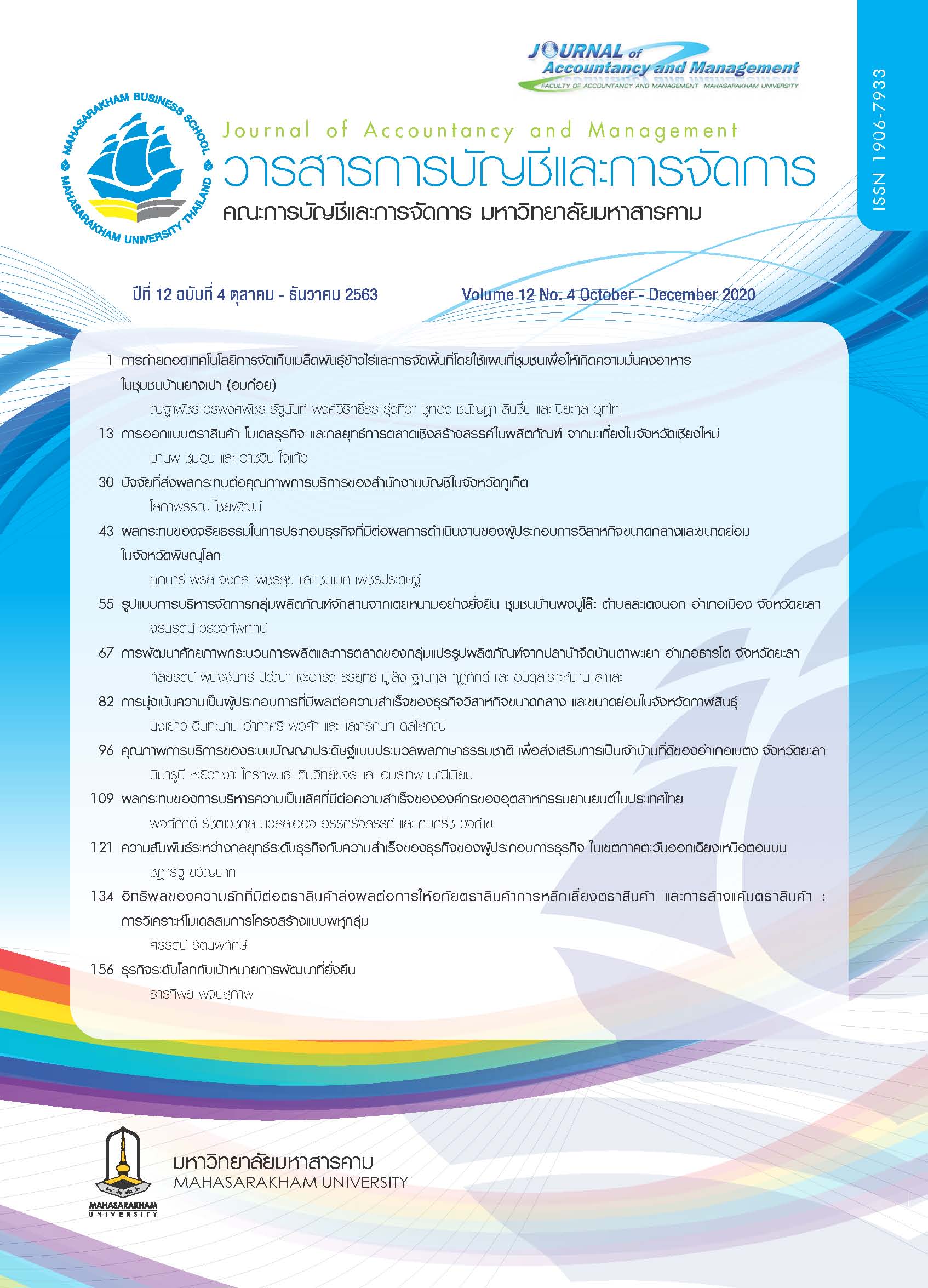ผลกระทบของการบริหารความเป็นเลิศที่มีต่อความสำเร็จขององค์กร ของอุตสาหกรรมยานยนต์ในประเทศไทย
Main Article Content
บทคัดย่อ
การวิจัยครั้งนี้มีวัตถุประสงค์ เพื่อศึกษาผลกระทบของการบริหารความเป็นเลิศที่มีต่อความสำเร็จขององค์กรอุตสาหกรรมยานยนต์ในประเทศไทย โดยใช้แบบสอบถามเป็นเครื่องมือในการเก็บรวบรวมข้อมูลจากผู้บริหารอุตสาหกรรมยานยนต์ในประเทศไทย จำนวน 162 ฉบับ สถิติที่ใช้ในการวิเคราะห์ข้อมูล ได้แก่ การวิเคราะห์สหสัมพันธ์พหุคูณ และการวิเคราะห์ความถดถอยแบบพหุคูณ ผลการวิจัยพบว่า 1) การบริหารความเป็นเลิศ
ด้านนวัตกรรม มีความสัมพันธ์และผลกระทบเชิงบวกกับความสำเร็จขององค์กร 2) การบริหารความเป็นเลิศ ด้านการจัดการความรู้ มีความสัมพันธ์และผลกระทบเชิงบวกกับความสำเร็จขององค์กร และ 3) การบริหารความเป็นเลิศ ด้านเทคโนโลยีสารสนเทศ มีความสัมพันธ์และผลกระทบเชิงบวกกับความสำเร็จขององค์กร ดังนั้น อุตสาหกรรมยานยนต์ควรให้ความสำคัญกับการจัดการความรู้ โดยองค์กรควรสนับสนุนพนักงานเกิดการพัฒนาตนเองอยู่เสนอ และต้องเกิดการแลกเปลี่ยนความรู้ภายในองค์กร นอกจากนี้ องค์กรควรให้ความสำคัญกับการนำข้อมูลสารสนเทศ มาใช้ประกอบในการวิเคราะห์ประมวลผล และช่วยในการตัดสินใจในการลงทุน หรือพัฒนางานต่าง ๆ เพื่อให้องค์กรสามารถตอบสนองต่อการเปลี่ยนแปลงที่ไม่สามารถคาดการณ์ได้และเทคโนโลยีสารสนเทศ โดยองค์กรควรส่งเสริมให้เกิดการใช้เทคโนโลยีสารสนเทศที่ทันสมัย เพื่อช่วยเสริมกระบวนการ ขั้นตอน วิธีการหรือกระบวนการใด ๆ ในงานทำงานของพนักงาน นอกจากนี้ควรส่งเสริมให้เกิดการประยุกต์ใช้โปรแกรมต่าง ๆ เพื่อความสะดวกในการติดต่อสื่อสาร และการประสานงานกัน ทั้งภายในและภายนอกให้เกิดการพัฒนาต่อยอดความรู้ด้านเทคโนโลยีอย่างสม่ำเสมอ
Downloads
Article Details
บทความที่ได้รับการตีพิมพ์เป็นลิขสิทธิ์ของวารสารการบัญชีและการจัดการ
ข้อความที่ปรากฏในบทความแต่ละเรื่องในวารสารวิชาการเล่มนี้เป็นความคิดเห็นส่วนตัวของผู้เขียนแต่ละท่านไม่เกี่ยวข้องกับมหาวิทยาลัยมหาสารคาม และคณาจารย์ท่านอื่นๆในมหาวิทยาลัยฯ แต่อย่างใด ความรับผิดชอบองค์ประกอบทั้งหมดของบทความแต่ละเรื่องเป็นของผู้เขียนแต่ละท่าน หากมีความผิดพลาดใดๆ ผู้เขียนแต่ละท่านจะรับผิดชอบบทความของตนเองแต่ผู้เดียว
เอกสารอ้างอิง
กลุ่มอุตสาหกรรมยานยนต์. (2559). การกําหนดทิศทางอุตสาหกรรมยานยนต์. ค้นเมื่อ 30 กันยายน 2560, จาก http://www.aic.or.th/home
จินตหรา แสงทะรา. (2556). ผลกระทบของศักยภาพทางด้านนวัตกรรมสมัยใหม่ที่มีต่อผลการดำเนินงานของสถาบันอุดมศึกษาในประเทศไทย. วิทยานิพนธ์บริหารธุรกิจมหาบัณฑิต สาขาการจัดการเชิงกลยุทธ์ มหาวิทยาลัยมหาสารคาม.
ดวงหทัย ใจภักดี. (2559). ความสัมพันธ์ระหว่างการจัดการความเป็นเลิศด้านเทคโนโลยีสารสนเทศกับความสำเร็จองค์กรของธุรกิจผลิตชิ้นส่วนยานยนต์ในประเทศไทย. วิทยานิพนธ์บริหารธุรกิจมหาบัณฑิต สาขาการจัดการเทคโนโลยีสารสนเทศทางธุรกิจ มหาวิทยาลัยมหาสารคาม.
พสุ เดชะรินทร์. (2548). เส้นทางจากกลยุทธ์สู่การปฏิบัติด้วย Balanced Scorecard. กรุงเทพฯ : โรงพิมพ์จุฬาลงกรณ์มหาวิทยาลัย
โพสทูเดย์. (2561). สภาอุตสาหกรรม. ค้นเมื่อ 30 กันยายน 2560, จาก https://www.posttoday.com/economy/545203
เยาวลักษณ์ จิตต์วโรดม. (2548). นวัตกรรมในมุมมองที่เป็นกุญแจหลักในการพัฒนาธุรกิจ. วิทยานิพนธ์บริหารธุรกิจมหาบัณฑิต มหาวิทยาลัยขอนแก่น.
ศักดิ์ดา สมแสน. (2556). ผลกระทบของความสำเร็จของการจัดการความรู้ที่มีต่อการพัฒนาองค์กรของธุรกิจขนาดกลางและขนาดย่อม (SMEs) ในภาคตะวันออกเฉียงเหนือ. วิทยานิพนธ์การจัดการมหาบัณฑิต สาขาการจัดการตลาด มหาวิทยาลัยมหาสารคาม
ศูนย์วิจัยกสิกรไทย. (2560). sme ก้าวทันกระแสยานยนต์. ค้นเมื่อ 30 กันยายน 2560, จาก https://www.kasikornbank.com/th/business/sme/KSMEKnowledge/article/KSMEAnalysis/Documents/ThaiAutomotive4.pdf
สมาคมผู้ผลิตชิ้นส่วนยานยนต์ไทย. (2560). สมาชิก. ค้นเมื่อ 30 กันยายน 2560, จาก http://www.thaiautoparts.or.th/index.php?op=member-index
สำนักงานเศรษฐกิจอุตสาหกรรม. (2561). รายงานภาวะเศรษฐกิตอุตสาหกรรม ปี 2560 และแนวโน้มปี 2561. กรุงเทพฯ : สำนักงานเศรษฐกิจอุตสาหกรรม
สุกัญญา ศุภกิจอำนวย และดุลยปวีณ กรณฑ์แสง. (2552). กลยุทธ์ ตัด ต่อ โต ฝ่าวิกฤตสู่เวทีโลก. กรุงเทพฯ : เนชั่นมัลติมีเดีย กรุ๊ป.
อัชณา ลิมป์ไพฑูรย์. (2561). ส่งออกชิ้นส่วนยายนต์. ค้นเมื่อ 5 มกราคม 2561, จาก http://www.thansettakij.com/index.php/content/268379
Aaker, D. A., Kumar, V., & Day, G. S. (2004). Marketing research. New Jersey : John Wiley & Sons.
Black, K. (2006). Business statistics : for contemporary decision making. New Jersey : John Wiley & Sons.
Nunnally, J. C., & Ira, H. B. (1978). Psychometric theory. New York : McGraw-Hill.
Oltean, F. D., Manuela, R. G., & Lia, C. C. (2014). Relation Between Information Technology and Performance: an Empirical Study Concerning the Hotel Industry in Mures County. Procedia Economics and Finance, 15, 1535–1542.
Paschek, D., Larisa, I., & Anca, D. (2018). Knowledge Management–The Foundation for a Successful Business Process Management. Procedia-Social and Behavioral Sciences, 238(2018), 182-191.
Porssa, A., & Hojjat, M. (2016). Develop an Information Technology Model to Improve Customer Service in IGCS1. Procedia-Social and Behavioral Sciences, 229(2016), 167–174.
Semuel, H., Siagian, H., & Stefanie, O. (2017). The effect of leadership and innovation on differentiation strategy and company performance. Procedia-Social and Behavioral Sciences, 237(2017), 1152–1159.
Yıldız, S., Baştürk, F., & İlknur, T. B. (2014). The effect of leadership and innovativeness on business performance. Procedia-Social and Behavioral Sciences, 150(2014), 785–793.


